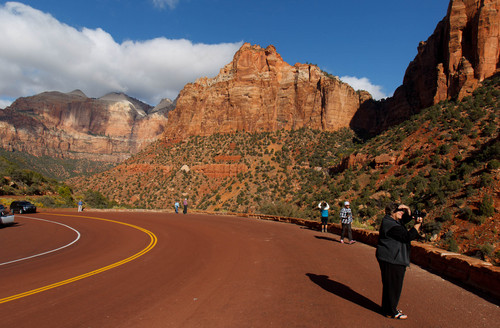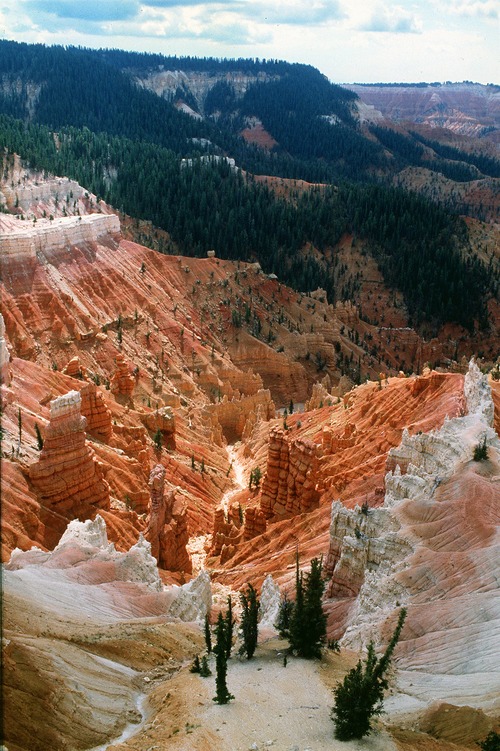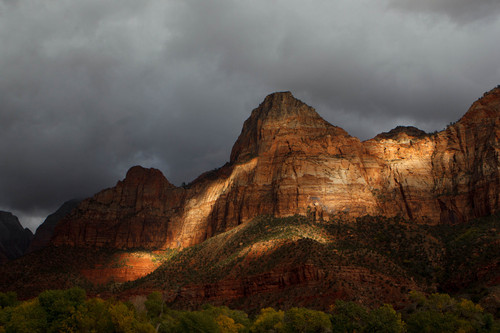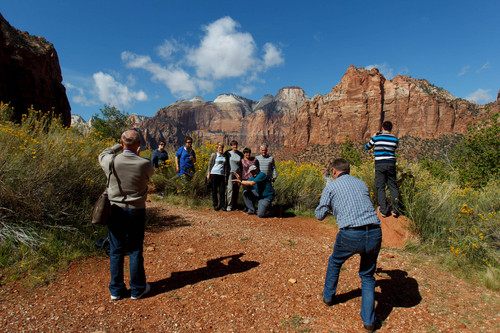This is an archived article that was published on sltrib.com in 2013, and information in the article may be outdated. It is provided only for personal research purposes and may not be reprinted.
Washington • You don't know what you've got 'til it's gone.
Joni Mitchell's words ring true after the recent government shutdown with a new poll showing that an overwhelming number of Americans thought the closure of national parks was a good reminder of how important those treasured landscapes are for the country and for local communities.
The closed signs at the Grand Canyon, the locked gate at Zion National Park and the barriers around the World War II Memorial were the face of the 17-day shutdown — but the images appear to have brought a resurgence of support for the nation's iconic locales.
Some 82 percent of voters surveyed for the left-leaning Center for American Progress said the shutdown showed them the value of national parks, and while no one is suggesting the federal government pave over paradise as Mitchell wrote in her iconic song, Americans are clear that they want their Edens to remain open.
"There really is a kind of message here that the parks and public lands really are tremendously important assets to the country," says Geoff Garin, president of Hart Research Associates, which conducted the poll in early November. "They're part of the legacy that we pass on to our children and our grandchildren and that we have an obligation that these places are maintained, they're honored and cherished, cared for and not allowed to go into a state of disrepair."
—
Don't cut parks • Some 55 percent of those surveyed also said that the mandatory, across-the-board cuts mandated by Congress, known as the sequester, went too far in hurting the national park system. Some 22 percent said the cuts — about $153 million this year — were about the right amount.
Moreover, 74 percent of respondents said Congress should not cut national-park funding to reduce the budget deficit while 15 percent said to slash away.
Garin says that national parks often poll well, like cute kittens, but the survey reveals that Americans don't want their national parks to face the ax when Congress starts looking for ways to shave spending.
"They don't want to kill the kitten when we're going through the sequester cuts," Garin said.
Interior Secretary Sally Jewell noted in a recent speech at the National Press Club that if there was a silver lining from the shutdown it was that it spotlighted how much Americans love their national parks.
"It reminded us that our parks, our wildlife refuges and our public lands are uniquely ours," Jewell said. "They're uniquely American. They're the places we go with our families to recreate, to seek beauty, to find solitude. They're our watersheds, our wildlife habitats. They're our economic engines. They're our sources of pride and history."
Indeed, on the economic front, the closure of the parks during the shutdown cost an estimated $76 million a day in lost revenue to local communities, according to Interior.
—
Fail-safe • Rep. Chris Stewart, a Utah Republican who sits on the House Natural Resources Committee, says the parks shouldn't have to close if there's a future budget impasse in Washington. He's introduced legislation that would direct the Interior secretary to enter into agreements with states to allow continued operation of the parks in case of another budget debacle.
Stewart's bill is scheduled for a hearing in the committee this week.
"It brings a lot of certainty," Stewart says of his legislation. "It brings a lot of certainty to the rural communities; it brings a lot of certainty to the small businesses who rely on those parks; And it brings a lot of certainty if you're from Boston or Germany or Korea and you're visiting" to see national parks.
Utah Rep. Ken Ivory, R-West Jordan, says there's no question people love their treasured landscapes but the better question is who should control them. The shutdown proved, he says, that a distant landlord in Washington can have impacts on local communities at a whim.
"We saw how that plays out from Washington: [national parks are] political pawns. In our state: it's a matter of our lives and livelihoods," Ivory said. "For us it's an $8 billion industry that employs people and funds education and funds local government services and in Washington it's just another political pawn to exact political retribution at a whim."
The Center for American Progress poll interviewed more than 1,000 voters who cast ballots in the 2012 election. The survey's margin of error was 3 percent.









